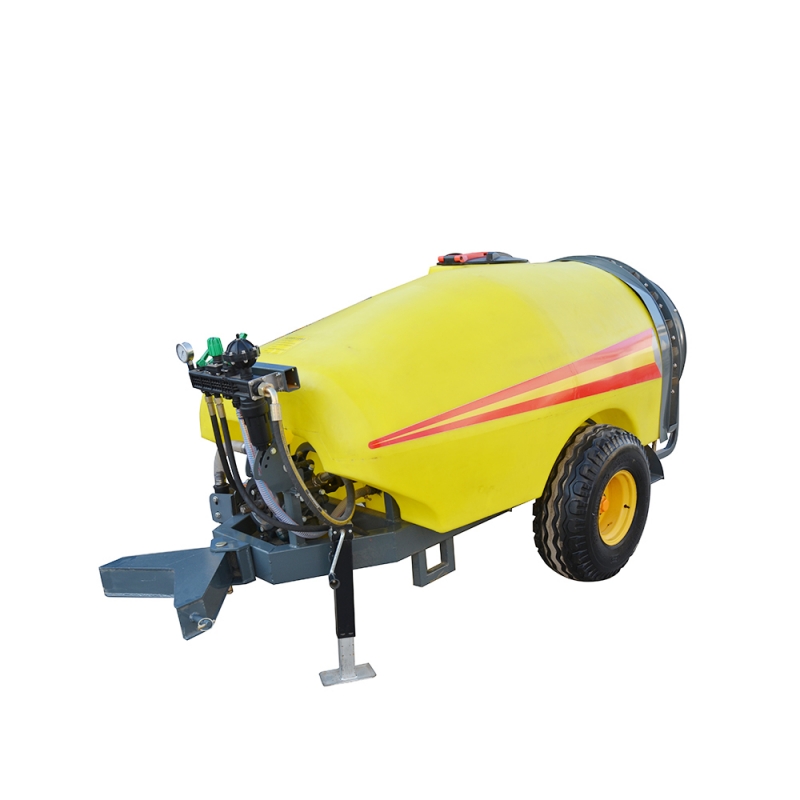Why is an Agricultural Sprayer Essential for Modern Farming?
2025-01-07
In the world of modern agriculture, farmers rely on a variety of tools and equipment to ensure that their crops are healthy and productive. One of the most important pieces of equipment for crop management is the agricultural sprayer. But why is an agricultural sprayer so essential for today’s farming practices? This blog will explore the various reasons why agricultural sprayers are indispensable for farmers and how they contribute to better crop yields, more efficient operations, and environmentally responsible farming.
What is an Agricultural Sprayer?
An agricultural sprayer is a piece of machinery used to apply pesticides, herbicides, fungicides, fertilizers, and other chemicals to crops in a controlled and efficient manner. Sprayers can be mounted on tractors, towed behind vehicles, or operated as handheld devices, depending on the size of the farm and the type of crops being cultivated.
Sprayers are designed to deliver a fine mist or spray of chemicals that can cover large areas of crops with precision. This ensures that the right amount of product is applied in the right place, minimizing waste and maximizing effectiveness.
Why Are Agricultural Sprayers Important for Farming?
1. Efficient Pest and Disease Control:
One of the main uses of agricultural sprayers is to apply pesticides and fungicides to crops to control pests and prevent the spread of diseases. Without an effective sprayer, it would be difficult to ensure that pesticides reach all parts of the crops uniformly. Insects, weeds, and fungal diseases can significantly damage crops, and if not properly managed, they can lead to a decrease in yield or even total crop loss. Sprayers allow for quick and efficient coverage, minimizing damage and protecting the crops.
2. Improved Fertilizer Application:
In addition to pest control, sprayers are also used for applying liquid fertilizers to crops. Fertilizers are essential for promoting healthy plant growth by providing nutrients that may not be sufficiently available in the soil. Agricultural sprayers ensure that the fertilizer is evenly distributed across the crops, promoting better growth and higher yields. Sprayers also help to reduce fertilizer waste by applying just the right amount needed for the plants, which can be more environmentally friendly than traditional fertilizing methods.
3. Weed Control:
Weeds compete with crops for vital resources such as water, sunlight, and nutrients. Unchecked weed growth can lead to stunted crop growth and lower yields. Herbicides applied via sprayers can effectively control weed growth without the need for manual labor or invasive methods. Sprayers enable farmers to target specific areas with herbicides, thus preventing the spread of weeds and ensuring healthy crop development.
4. Precision and Efficiency:
Modern agricultural sprayers come equipped with advanced technology, allowing for precise application of chemicals. This precision helps to reduce the amount of product used, ensuring that the chemicals are applied where they are most needed. With the ability to adjust spray pressure, nozzle size, and spray width, farmers can optimize the sprayer for different crop types and field conditions. This means that farmers can reduce costs and improve the efficiency of their operations.
5. Time and Labor Saving:
Before the advent of sprayers, farmers had to rely on manual labor to apply pesticides, fertilizers, and other treatments. This was a time-consuming and labor-intensive process. With agricultural sprayers, however, farmers can cover large areas of land in a fraction of the time, allowing them to focus on other important aspects of farm management. This increased efficiency is especially critical in large-scale farming operations where time and labor costs can be significant.
6. Environmentally Responsible Farming:
While the use of chemicals in agriculture can have environmental impacts, sprayers help to mitigate this by ensuring that products are applied more efficiently and with precision. By reducing waste and applying chemicals only where they are needed, agricultural sprayers help minimize the risk of over-spray or run-off, which can harm surrounding ecosystems. Furthermore, many modern sprayers are designed with environmental considerations in mind, including features that reduce drift and improve targeting accuracy.
7. Versatility for Different Applications:
Agricultural sprayers are versatile and can be used for a variety of applications. They are commonly used for pesticide, herbicide, and fertilizer application, but they can also be used for watering crops or applying foliar feeds. Some sprayers are even designed to handle specialized tasks like applying growth regulators or organic treatments. This versatility makes sprayers an all-in-one solution for a wide range of agricultural needs.
Types of Agricultural Sprayers
There are several types of agricultural sprayers, each suited for different needs and field conditions. Here are some of the most common types:
1. Boom Sprayers:
Boom sprayers are commonly mounted on tractors and consist of a series of spray nozzles arranged on a boom. These sprayers are ideal for large fields and are capable of covering wide areas quickly and evenly. They are often used for applying pesticides, herbicides, and fertilizers.
2. Backpack Sprayers:
Backpack sprayers are smaller, portable sprayers that are carried on the back of the operator. These sprayers are ideal for smaller farms or areas that are difficult to access with larger machinery. They are often used for spot treatments, such as applying pesticides to individual plants or areas with weed problems.
3. Airblast Sprayers:
Airblast sprayers use a high-powered fan to propel the spray mist toward crops. These sprayers are typically used for tree crops like apples, cherries, or citrus, where the spray needs to cover the entire canopy of the tree. Airblast sprayers are known for their ability to provide thorough coverage, especially in orchards and vineyards.
4. Self-Propelled Sprayers:
Self-propelled sprayers are advanced sprayers that come with their own engine and wheels. They are capable of covering large areas quickly, and their ability to move independently makes them ideal for large-scale farming operations. These sprayers are often equipped with GPS systems and other precision farming technologies to optimize the application process.
5. Tow-Behind Sprayers:
Tow-behind sprayers are pulled by a tractor or other vehicle. These sprayers are available in various sizes and are suitable for both large and small-scale farms. Tow-behind sprayers are typically more affordable than self-propelled models, but they still offer significant efficiency benefits for larger farms.
How to Choose the Right Agricultural Sprayer
Selecting the right agricultural sprayer depends on several factors, including the size of the farm, the type of crops being grown, and the specific needs of the operation. Here are a few considerations to keep in mind:
1. Field Size:
Larger fields may require boom or self-propelled sprayers, which can cover wide areas quickly. Smaller farms or specific areas within larger farms may benefit from backpack or tow-behind sprayers.
2. Crop Type:
The type of crop you are growing will influence your choice of sprayer. For example, airblast sprayers are ideal for orchards, while boom sprayers work well for row crops like corn or soybeans.
3. Spray Volume:
Consider how much liquid needs to be applied to your crops. High-volume sprayers are suitable for larger fields or for tasks that require more liquid, such as watering or applying large quantities of fertilizer.
4. Technology Features:
Many modern sprayers come with advanced technology, such as GPS tracking, automated control systems, and precision application features. If precision and efficiency are a priority, investing in a sprayer with these features may be beneficial.
Conclusion: A Vital Tool for Successful Farming
In conclusion, agricultural sprayers are an essential tool for modern farming, helping to increase efficiency, reduce labor costs, and ensure healthier crops. Whether it’s for pest control, fertilization, or weed management, sprayers play a crucial role in maintaining optimal crop growth and maximizing yield potential. As farming practices continue to evolve, agricultural sprayers will remain at the forefront of technology, ensuring that the global demand for food is met in a sustainable and efficient manner.
By selecting the right sprayer and using it properly, farmers can ensure that their crops thrive, productivity improves, and their farming operations remain profitable and environmentally responsible.



